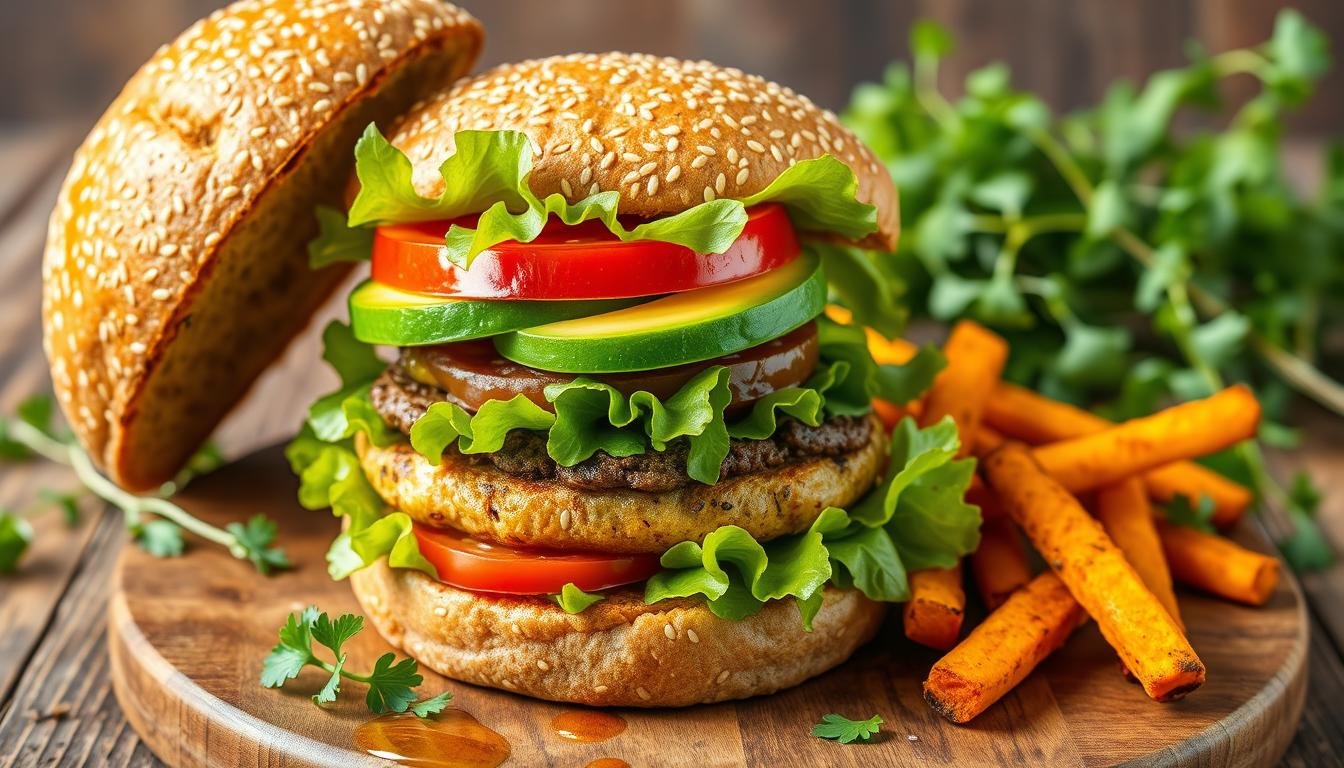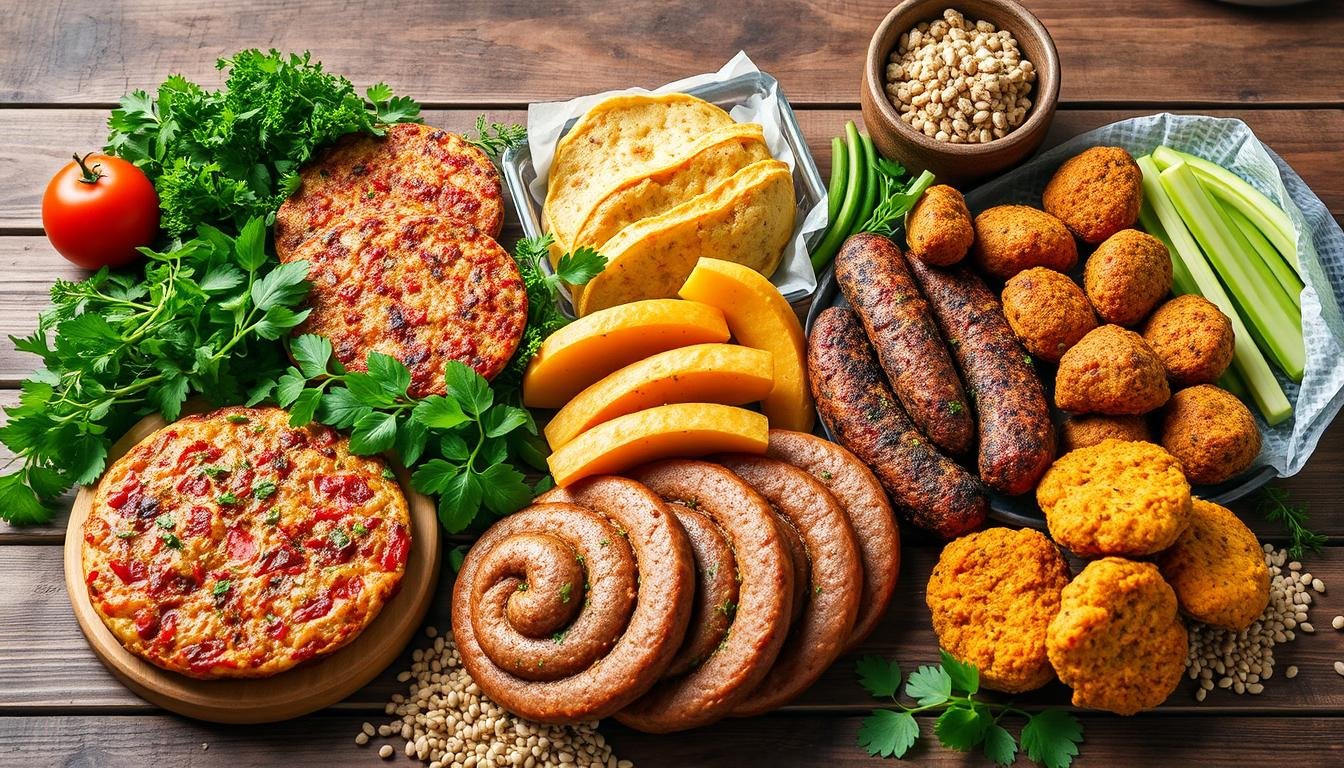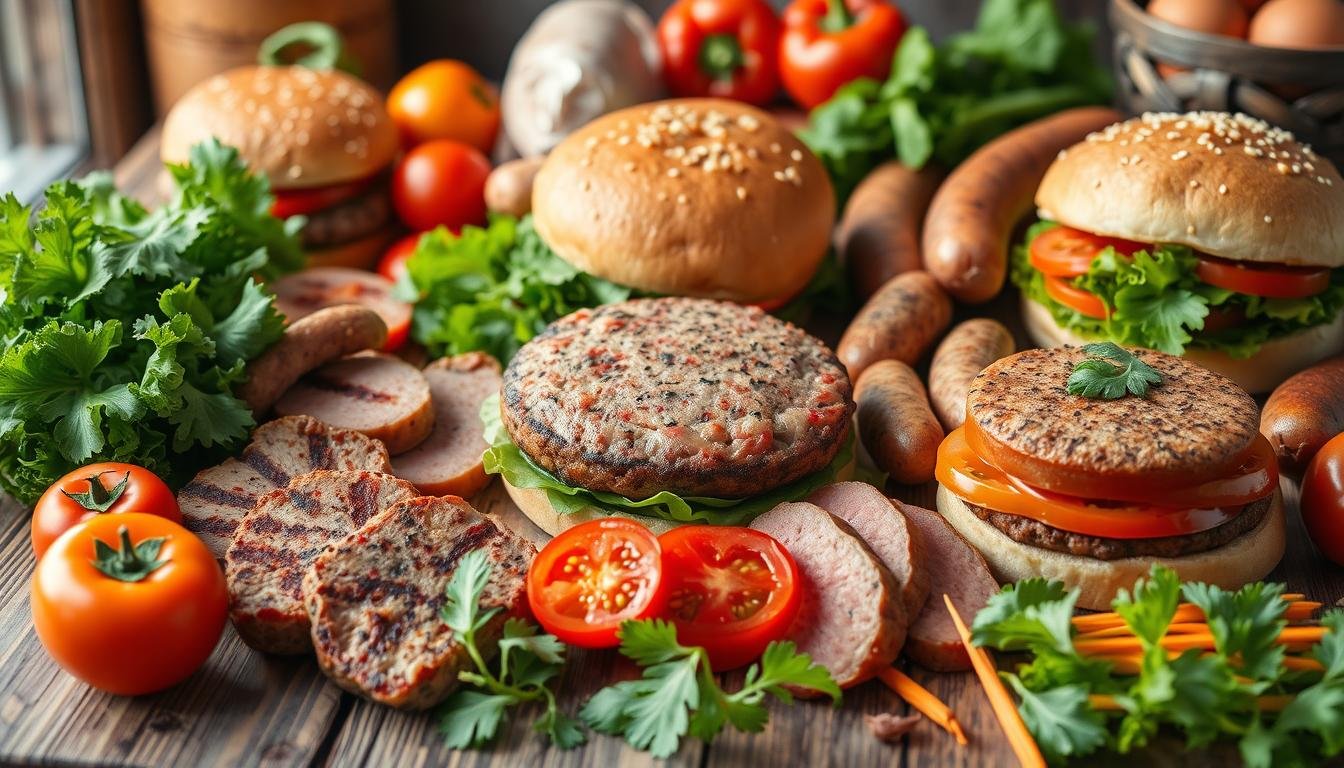Are you trying to eat less meat and find greener food options? The plant meat burger scene is booming. Companies like Beyond Meat, Impossible Foods, and Sweet Earth lead the way. They make plant-based patties that taste, feel, and look like real meat.
Plant-based burgers are gaining much popularity. They can be bought in stores and restaurants around the U.S. They don’t only taste great, but they are also helpful to the environment. By using plant meat burgers, pollution is reduced, resource consumption is saved, and more humane food choices are given.
These are great for any individual: vegan, flexitarian, or just wanting to eat more plants. Amazing flavours and textures that even meat lovers will appreciate. Experience the benefits of sustainable food by trying plant meat burgers today.
Understanding Plant-Based Burger Evolution
Lately, big changes have been seen in the plant-based meat industry, and it now has new leaders: Beyond Meat and Impossible Foods companies. They created the burgers tasting and feeling almost like real ones but are designed according to more ecological approaches.
The Rise of Meat Alternatives
More people want to eat in ways that are good for the environment and animals. They’re looking for healthier food choices. The plant-based meat industry has answered by creating tasty, meat-like products.
Key Players in the Market
There are many frontline names in the plant-based meat market. Beyond Meat uses peas for protein. There’s also Impossible Foods with yeast to get that beefy taste. MorningStar Farms and Sweet Earth can’t be left behind to do theirs.
Environmental Impact and Sustainability
The main reason for the growth of plant-based meat is its eco-friendly benefits. The Impossible Burger uses much less land, and water, and creates fewer emissions than beef. This makes it appealing to those who care about the planet.
“The plant-based meat industry is not just about replicating the taste and texture of traditional meat; it’s about creating a more sustainable and ethical food system that benefits both people and the planet.”
Plant Meat Burger: Ingredients and Composition
Ever wonder what’s in a plant-based burger? You’re in the right place. These patties mix plant proteins, fats, and tasty ingredients for a meat-like taste.
Pea protein, soy protein, and wheat protein are the key. They give the burger its texture and shape. Coconut oil adds juiciness and feel, just like beef.
The flavour and colour of the burger come from beet juice and the spice of onion and pepper. The patty gets the meat feel due to methylcellulose and hydrocolloids.
All secret mixes in Beyond Burger or Impossible Burger are unknown. Impossible Burger tastes like beef because it contains soy leghemoglobin and “bleeds”.
Nearly exact protein from each patty in plant-based burgers targets; 19 to 25 grams in meat.
The plant-based burger world is always changing. It’s getting better and more like traditional beef patties.
Taste Test: Top Meatless Burger Brands Compared
We gathered 10 tasters to find the best plant-based burger. They tested top brands and gave their opinions. The winners were clear in texture, flavour, and taste.
Texture and Appearance Analysis
The Impossible Burger was a hit for its beef-like texture and look. The Beyond Burger was also impressed with its plump shape and crispy outside. Other favourites were the Sweet Earth Awesome Burger and Kroger’s Simple Truth Emerge Burger.
Flavor Profile Comparison
The Impossible Burger won for its beef-like taste. The Beyond Burger was close, with its savoury flavour. The Dr. Praeger’s Perfect Burger and Trader Joe’s Protein Patties were also praised for their unique tastes.
Consumer Preferences
The Impossible Burger and Beyond Burger were the top choices. People loved burgers that tasted like real beef. But, they also enjoyed the unique tastes of some plant-based options.
| Burger Brand | Protein Content (g) | Taster Preference Ranking |
|---|---|---|
| Sweet Earth Awesome Burger | 25 | 4 |
| Beyond Burger | 20 | 2 |
| Kroger Simple Truth Emerge Burger | 20 | 5 |
| Dr. Praeger’s Perfect Burger | 20 | 6 |
| Trader Joe’s Protein Patties | 18 | 7 |
| Whole Foods 365 Burgers | 12 | 8 |
| Impossible Burger | 19 | 1 |
This taste test shows there are many great plant-based burgers out there. Whether you want something like beef or something new, there’s a lot to try.
Cooking Methods and Best Practices
It requires much attention to minute details because most brands state that their plant-based burgers need to be cooked to a medium-rare or medium state for them to stay juicy and full of flavour. If they are overcooked, they turn dry and flavourless.
You can cook meatless burgers in a pan, grilling, or oven. For instance, the Impossible Burger is cooked just like beef, how one prefers it. However, always refer to the package of your meatless burger for specific cooking times and instructions.
Adding tasty toppings and condiments can make your burger even better. Some great choices include:
- Plant-based mayonnaise
- Ketchup
- Sweet pickle relish
- Freshly ground black pepper
- Lettuce, pickles, tomatoes, sliced onions
- Vegan-friendly sauces and dressings
By following the cooking instructions and trying out different toppings, you can make a delicious plant-based burger. It will be tasty and good for the planet.
| Cooking Method | Time | Temperature |
|---|---|---|
| Pan-Frying | 3-4 minutes per side | Medium-high heat |
| Grilling | 3 minutes per side | Medium-high heat |
| Oven-Baking | 10-12 minutes | 400°F (200°C) |
The secret to great meatless burgers is to cook them as the brand suggests. Then, try different toppings and condiments to find your favourite flavour.
“The plant-based burgers brown nicely when pan-fried or grilled, similar to beef burgers, and do not stick to the pan.”
Nutritional Benefits and Protein Content
Plant-based burgers are often as protein-rich as traditional beef burgers. The Beyond Burger has 20 grams of protein per patty. The Impossible Burger has 19 grams. They have 250 to 300 calories per serving, which is less than beef burgers.
Protein Comparison with Traditional Burgers
Plant-based burgers have the same amount of protein in them as 80/20 ground beef. They are, therefore, for people who want to reduce meat consumption. They provide a good source of quality protein.
Caloric Content and Dietary Considerations
They have less saturated fat and no cholesterol, but possibly higher in sodium, to up to 370 mg per patty. So they are meant to be enjoyed in moderation as part of a healthy diet.
FAQ
What are plant meat burgers?
Plant meat burgers feel and taste like beef burgers but are delicious, eco-friendly choices instead of beef burgers: They mix plant proteins, fats, and flavourings to resemble meat.
Who are the key players in the plant-based burger market?
Top names for plant-based burgers include Beyond Meat, Impossible Foods, MorningStar Farms and Sweet Earth. They’re working on products that so many other people love.
What are the environmental benefits of plant-based burgers?
Plant-based burgers are better for the planet than beef burgers. They need less land, and water, and make fewer emissions.
What are the common ingredients in plant meat burgers?
Plant meat burgers use proteins like pea, soy, and wheat, and fats like coconut oil. They also have flavourings like beet juice.
How do the top plant-based burgers compare in taste and texture?
The Impossible Burger and Beyond Burger are favourites. The Impossible Burger looks and feels like beef. The Beyond Burger is known for its juicy inside and crispy outside.
How should plant-based burgers be cooked?
Cooking plant-based burgers right is key. Most brands say to cook them to medium-rare or medium. Cooking too long can make them dry and tasteless.
How do plant-based burgers compare to traditional beef burgers in terms of nutrition?
Plant-based burgers have similar protein to beef, with 19-25 grams per patty. But, they might have more sodium and processed stuff. They’re okay in a balanced diet but should be eaten in moderation.



